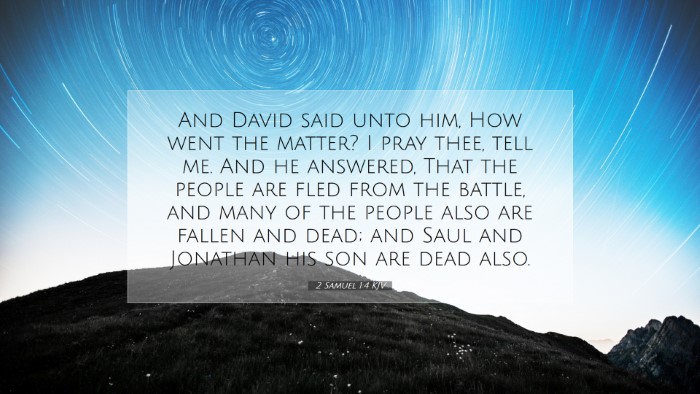Commentary on 2 Samuel 1:4
Bible Verse: 2 Samuel 1:4 - "And David said unto him, How went the matter? I pray thee, tell me." This verse depicts King David's inquiry regarding the outcome of the battle at Mount Gilboa, where Saul had been defeated.
This moment is crucial not only in the narrative of David's ascent to kingship but also in understanding the profound emotional landscape that accompanies the fall of Saul, including themes of loss, grief, and complex human relationships.
Contextual Analysis
The chapter opens in the aftermath of the battle in which Saul has perished, a pivotal event for the nation of Israel. David, who had previously experienced a complicated relationship with Saul, now confronts the repercussions of this tragic unfolding.
1. The State of Israel
The defeat of Saul marks a new era for Israel. David's inquiry about the battle's outcome reflects his leadership qualities, showcasing both his concern for the nation and a genuine interest in personal relationships. This discord between the national loss and personal loyalty is seen throughout the historical books of the Bible.
2. The Role of the Amalekite
The man's arrival with news of Saul's death is significant. He claims to have killed Saul, which is a crucial point for theological reflection on truth, deception, and the consequences of the actions we take.
Theological Insights
In seeking to derive theological significance from this verse, we explore the implications of David's question and the surrounding circumstances. Several public domain commentaries provide a deeper spiritual interpretation.
Matthew Henry's Commentary
Matthew Henry notes that David's question reveals his desire for clarity and understanding in the face of tragedy. This inquiry demonstrates his sensitivity toward the situation and points to the complexity of kingship. David's mourning, rather than rejoicing over Saul's death, further illustrates the weight of compassion in true leadership. His words reflect a heart for the people and a recognition of Saul's prior place in God's plan.
Albert Barnes' Commentary
Albert Barnes emphasizes the care David takes in understanding the details of the battle. Barnes highlights that David's perspective is rooted in a respect for both God’s will and the tragic nature of human conflict. David's inquiry not only relates to his future as king but also reflects his moral character. By seeking the truth behind the battle, David underscores the importance of integrity in leadership.
Adam Clarke's Commentary
Adam Clarke provides a detailed analysis of the emotional turmoil surrounding this moment. Clarke suggests that David's question is not just a matter of political interest but reflects a deeper personal sorrow over the loss of his former mentor and king. For Clarke, this verse encapsulates the tension between mourning a fallen leader and the political realities that accompany such a loss, emphasizing David's authenticity and heartache. This highlights that the pain of loss is common even among leaders who are seen as strong and capable.
Lessons for Today
The lessons drawn from 2 Samuel 1:4 are abundant for pastors, students, theologians, and Bible scholars alike. Here are a few key takeaways:
- Value of Relationships: The significance of David's inquiry can be viewed through the lens of valuing relationships even in political contexts. Leaders are called to maintain compassionate connections, as exemplified by David's reaction.
- Mourning and Leadership: The complexity of sorrow in leadership roles is reflected in David’s mourning for Saul. It challenges contemporary leaders to embody empathy and understanding in their leadership styles.
- The Search for Truth: David's pursuit of clarity in the aftermath of tragedy speaks to the importance of seeking truth in our own lives. In an era marked by misinformation, this biblical example encourages diligence in discerning the reality around us.
- Divine Sovereignty: The broader context of Saul’s death leads to reflections on divine sovereignty and human choices. It opens dialogues on how God works through flawed leaders and the impact of human decision-making on divine plans.
Conclusion
2 Samuel 1:4 serves as a poignant reminder of the emotional and moral complexities surrounding leadership and personal relationships within the biblical narrative. The insights drawn from public domain commentaries elevate our understanding of this text, urging modern readers to engage thoughtfully with these themes. As we explore the intertwining paths of loss, leadership, and divine purpose, we are reminded of the compassionate heart that characterizes true leadership as illustrated by David.


